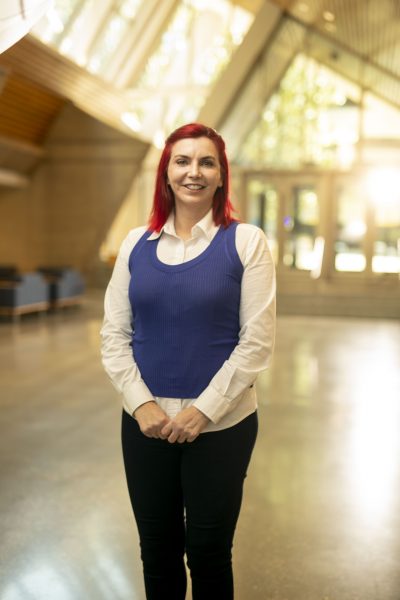A partnership between Vanderbilt University and Fisk University has received a grant of nearly $500,000 from the Alfred P. Sloan Foundation to increase research capacity and wellness support. The grant will be used to create the first graduate certificate course in multi-messenger astronomy in the nation.
The grant application was submitted by Kelly Holley-Bockelmann, Stevenson Professor of Physics, and Arnold Burger, a physics professor at Fisk University, who serve as co-directors of the Fisk-Vanderbilt Master’s-to-Ph.D. Bridge Program, a partnership that began more than 20 years ago to create equitable pathways to STEM education.

“We are guided by the science of broadening participation. We are experimenting with infusing inclusion into everything we do, from team teaching to group research to community mentoring,” Holley-Bockelmann said. “The idea is that our graduates will seed the field with leaders who will propagate more inclusive and equitable values.”
The grant will be used to develop the Multi-messenger Astronomy Postdoc-to-Faculty Program at Fisk, with extensive mentoring and professional development within the Fisk-Vanderbilt Bridge Program model.
Sight, hearing and touch give humans diverse types of information about their environment; light, particles and gravity do the same for astronomers studying the universe. Multi-messenger astronomy gathers information about the cosmos from various sources.
“By combining multiple messages from light, particles and gravity, we can get a more complete understanding of some of the most extreme phenomena in the universe, such as stellar explosions, black holes and the birth of the universe,” Holley-Bockelmann said. “This grant helps us pull together the talent and infrastructure for our ultimate vision of Fisk and Vanderbilt as a national nexus of multi-messenger astronomy.”
Fisk University, a historically Black university, was founded in 1867 with the mission to create an educational institution “open to all, regardless of race.” In 2002, Burger helped design the Fisk-Vanderbilt Bridge Program to increase the number of underrepresented minority students engaged in Ph.D.-level STEM research. He has served as Fisk’s representative co-director since the program’s founding.
“We are grateful for winning this award that reinforces the trust in our academic excellence in education, research, training and mentoring. This grant will allow us to continue to cultivate the next generation of scholars and leaders for success in astrophysics and its related disciplines,” Burger said.
Holley-Bockelmann was named Vanderbilt’s representative co-director for the program in 2015. She received the 2022 Mentor Award from the American Association for the Advancement of Science for her work with the program. The award is given to individuals who have mentored significant numbers of underrepresented minority students (e.g., women, racial and ethnic minorities, persons with disabilities) who are working toward STEM-related doctorates.
During Holley-Bockelmann’s time as the Vanderbilt director, the program has established skill-building boot camps for entering students, expanded student support to include wellness coaching, created an emergency fund to cover unexpected expenses that federal grants do not cover, and supported student efforts to create the Bridge Activism Committee to act on social justice issues.
Since accepting its first student in 2004, more than 170 students have enrolled in the program with 137 master’s degrees awarded. In all, 120 students bridged to Ph.D. programs and 52 earned a Ph.D., 41 of those at Vanderbilt. About 80 percent of the students identify as non-white minorities, with 58 percent identifying as female.
The Alfred P. Sloan Foundation, created in 1934 by its industrialist namesake, funds research and education in science, technology, engineering, mathematics and economics. Part of its mission is to “foster a robust, diverse scientific workforce.”
The grant was a limited submission opportunity announced by Research Development and Support within the Office of the Vice Provost for Research and Innovation, which assists faculty members with proposal development for strategic funding opportunities from government and nonprofit organizations. Services include coordination for complex proposals, content development and draft review. They also support faculty by building relationships with external sponsors, hosting workshops and providing guides and language for common proposal requirements.
